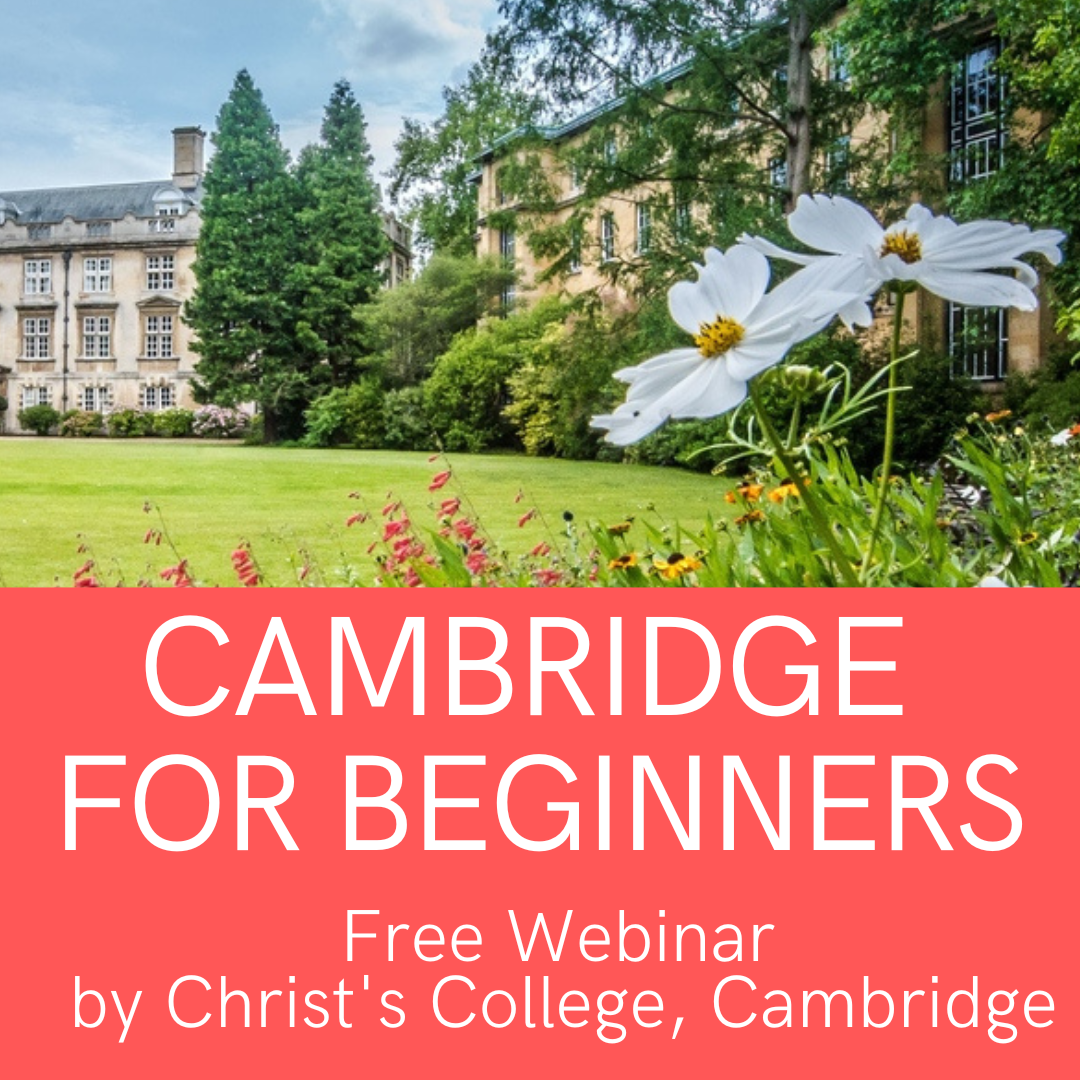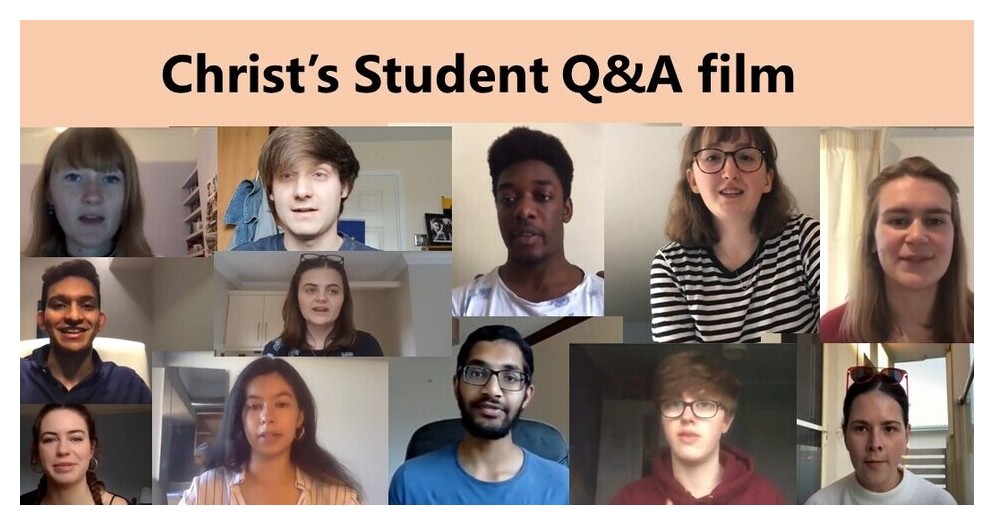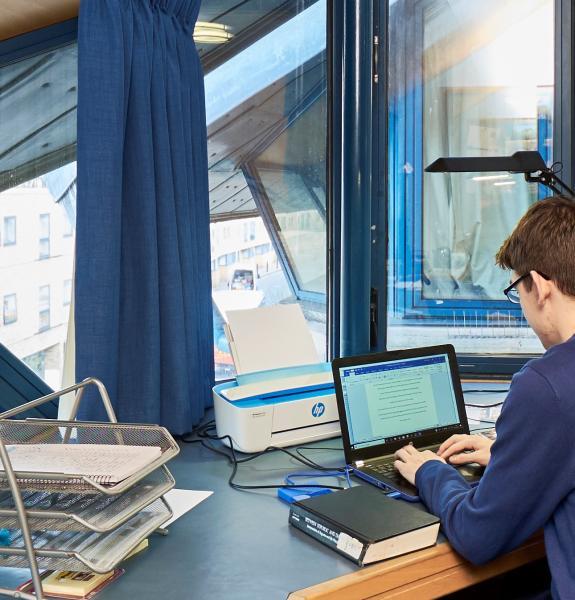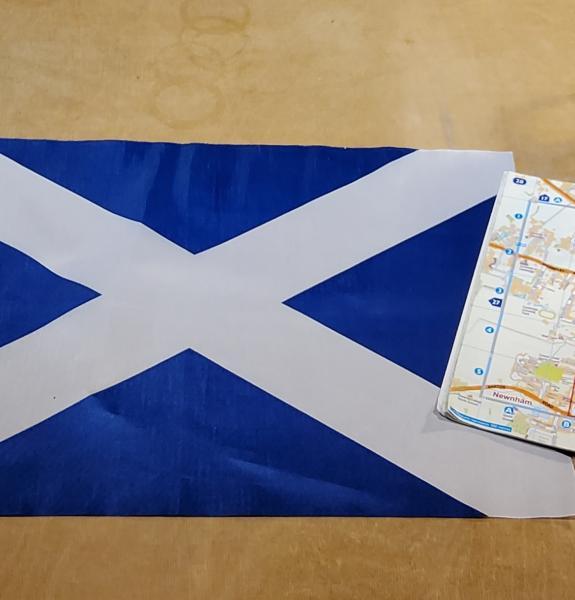
- Why study Engineering at Christ's?
- Course content and structure
- Teaching
- What do our students think?
- How to apply
- Helpful Resources
- Open Days and Online Events
- Want to know more?
| Booking is open for our Engineering subject meeting on Tuesday 27 May |
Why study Engineering at Christ’s?
At Christ’s we welcome Engineering students from all across the world. Our six Fellows work together with research students and external academics to cover all aspects of Engineering at a high level, so you can be confident of an outstanding start in the subject.
Our graduates go on to work in a range of sectors, including in traditional engineering companies, consultancies, management consultancies, investment banks, hedge funds, start-ups, research and for online giants such as Google and Facebook.
Course content and structure
Please visit the University website for full details of the Engineering course content and structure.
Cambridge offers two courses (or ‘triposes’) in Engineering:
- Engineering (with specialisation in one of the main engineering disciplines in 3rd and optional 4th year)
- Manufacturing Engineering (specialist training in marketing, design, manufacturing engineering and factory operation in the third and fourth years).
There is also a separate Chemical Engineering and Biotechnology degree, or after two years of Engineering you can opt for the one-year Management Studies course to gain a BA degree after a total of three years of study.
Please visit the University website for full details of the Engineering course content and structure, including the course film. You will also find information on the Department of Engineering page for prospective applicants. If you have further questions about course content, please contact ugrad-admissions@eng.cam.ac.uk.
Teaching
Christ’s College has the following Engineering Fellows and Bye-Fellows whose broad collective expertise means we’re well placed to support your studies.
- Dr Elena Punskaya (Director of Studies) Fellow and Affiliated Lecturer in software Engineering and Design
- Dr Sam Stanier Fellow and College Lecturer in Engineering, University Senior Lecturer in Civil Engineering
- Prof Mark Girolami Fellow and Professor of Civil Engineering
- Dr Ho-On To, Research Fellow working on aero-propulsion
- Dr Timos Kipouros Bye-Fellow and supervisor in Engineering Materials
- Dr Luca Sapienza Fellow and College Lecturer in Quantum Engineering; Associate Professor in Quantum Engineering
- Dr Graham Spelman Bye-Fellow and Supervisor in Engineering Mechanics
- Dr Dai Jones Life Fellow in Engineering and Materials
- Dr Richard Turner Bye-Fellow and University Lecturer in Computer Vision and Machine Learning
- Professor Peter Rayner Emeritus Professor; Information Engineering
The University’s Engineering Department arranges all your classes, lectures and practicals. Christ’s Director of Studies in Engineering Dr Elena Punskaya helps organise your work and ‘supervisions’. These weekly small-group tutorial sessions with College Fellows, university lecturers or research workers give you the advantage of personally-tailored tuition and guidance. And we’re willing to provide extra sessions if needed.
Christ’s is handily located right in the heart of Cambridge, only 15 minutes’ walk from the Engineering Department.
What do our students think?

Read about the experiences of Annie, Andrew, Ollie, and Hiral who recently studied Engineering here at Christ’s. There's also Statos, who did first year Engineering before changing to Natural Sciences (Physical).
If you’d like to hear from other Christ's students, please watch the Christ's student Q&A film, and visit our Student Profiles page.
"I'd advise any applicants to go into the course with an open mind about specialisms – often people change their minds after studying all of Engineering for the first two years!"
How to Apply
Visit How to Apply for full details and a timeline of the application process. We welcome applicants from all backgrounds and school types, all over the world. If you're applying from outside the UK, please read our international students section.
| News |
|---|
|
Subject requirements
If you are taking or have taken A-levels (not including Singapore A levels) and applying to Christ's College then there are three required subjects:
- Mathematics
- Physics
- Further Mathematics
If your school does not offer Further Mathematics, you may be able to get support through the Advanced Mathematics Support Programme. It can support you by offering advice about choosing Further Mathematics, revision events, university applications, enrichment materials and activities, and tuition, when it is not available through your school or college.
If you are studying for another qualification then you should take
- Mathematics (International Baccalaureate students should take HL Maths Analysis and Approaches)
- Physics
- Ideally, a third mathematical / science subject at IB Higher, Scottish Advanced Higher or equivalent.
- If you are applying with Scottish Advanced Highers, please see the information here.
There is no additional STEP requirement for Engineering at Christ's.
A number of our international candidates from countries where you study a wide range of subjects at school in the final two years find it helpful to take part in mathematics competitions as a way to focus on extending their mathematical knowledge and ability.
ESAT (Registration required)
All applicants for Engineering at Cambridge must sit a computer-based assessment called the ESAT (Engineering and Science Admissions Test) as part of the application process. This is the same at all Cambridge Colleges.
ESAT 2025 Registration deadline: To be confirmed (deadline expected to be available by early May)
ESAT 2025 Test dates: Thursday 9 and Friday 10 October 2025 (as confirmed on the UAT UK website)
You must register for and take the ESAT in the correct sitting. For students applying to Cambridge in September 2025 (for Oct 26 or deferred Oct 27 entry), please check the dates and details on the ESAT website from May 2025. You can normally create an account, pay the registration fee and register from early August, the registration deadline is normally mid-September (date to be confirmed), and you take the ESAT in person at a Pearson Vue Test Centre in mid-October. You must use the October sitting in the year you apply - tests sat on other dates are not accepted. There are test centres in countries all over the world. You will receive your results via Pearson Vue approx six weeks after you sit the test (results are automatically shared with us as well - you do not need to send them to us).
Please read the ESAT summary and then look at the UAT UK website for full details, including preparation information, how to register and book your test, details for UK applicants in financial need and students who have access requirements for a disability.
There is no set score that we are looking for and we don't expect you to get every question right. The ESAT forms part of our holistic admissions process, which means that we will look at your scores in the context of your whole application.
Interviews
If we invite you for interviews, these usually take place in early December. Those invited for Cambridge interviews are normally interviewed for 35-50 minutes in total. At Christ’s, we usually split the time into two interviews with subject-relevant academics. Further detail about the format of interviews will be available here nearer the time.
During the interviews we might ask you about topics you're not familiar with. Our aim is to assess your innate engineering and/or scientific ability when working through unprepared questions and see how quickly you absorb new ideas. It's not about catching you out. We help you work through unseen problems and ask you to think out loud as you tackle them, so we understand your individual approach. Do not forget that the interviews are not just there for us to ask you questions. They provide you an excellent opportunity to ask us about the course, the College and the University.
Further, more general information about interviews (including two useful films) is available in the Cambridge interviews section, and it's worth also having a look at supervisions (short film here), as interviews are similar to what you do every week as a Cambridge student.
Offers
We typically admit between eight and twelve Engineering students per year.
We define the terms of each offer individually, but offers for Engineering are likely to be minimum:
- A*A*A at A-level including A* in A-level Further Maths. You must pass any practical assessments for science subjects.
- 42 points overall in the International Baccalaureate with 7,7,6 in relevant Higher Level subjects
- A1, A1, A2 in three relevant Scottish Advanced Highers (See the Engineering from Scotland page)
You need to be academically ambitious: the majority of Christ's students arrive with higher grades than are required.
If you're taking another qualification, we expect you to be working at or close to the top of the mark range i.e.
- Baccalauréat français international (BFI): 17 (mention très bien) out of 20 overall, with a minimum of 17 in relevant subjects
- European Baccalaureate: at least 85% overall, with 9/10 in relevant subjects
You can look up other qualifications in the offer levels for other exam systems and international entry requirements, and if you are applying from outside the UK please read the Christ's international students section for further information and check the country pages.
If you will have finished school when you apply, please also read about post-qualification applications, taking a gap year, and, if relevant, applying from a university.
Taking a gap year
For those who are considering a gap year, deferred entry applications and post-qualification applications for Engineering are encouraged by the College. A gap year can offer a valuable opportunity to travel and/or gain work experience in an industrial setting (via, for example, the Year in Industry Scheme), which can be a major advantage during the undergraduate course. See the industrial placements information on the Engineering Department website.
Helpful Resources
| ESAT preparation materials | Including specification and sample tests with explained answers. There is also an archive of old ENGAA papers that contain questions of the kind found in the ESAT. |
| I want to study Engineering | Cambridge Engineering Department resource to help you to develop and practice problem-solving skills for Engineering courses at competitive universities. |
| Advanced Mathematics Support Programme | Website with advice on choosing Further Mathematics, revision events, enrichment materials and activities, and tuition, when it is not available through your school or college. See in particular A level Maths resources and A level Further Maths resources. If you're studying independently, Integral offers an online Further Maths course, and there are also free Further Maths videos. |
| Imperial College London A level Further Maths skills course | This is to support students taking Further Maths A level (so you can use the free version) - it does not replace the A level Further Maths qualification. |
| Isaac Physics | Website to help you develop problem-solving skills in Physics from GCSE to A-level through to the transition to university. See A-level resources and student support. There is also a mentoring scheme. |
| A-Z of Women in Engineering | Resource made by Stemettes |
| Nuffield Research Placements | Year 12 opportunity to work on a summer research project. Strict eligibility criteria apply. |
| F1 in schools or Greenpower Education Trust | Use IT to learn about physics, aerodynamics, design, manufacture, branding, graphics, sponsorship, marketing, leadership/teamwork, media skills and financial strategy, and apply them in a practical, imaginative, competitive and exciting way. |
| Engineering video FAQ's | See FAQ's on course content, and on specialisations |
| Recommended reading | Suggestions for budding engineers if you are looking for an interesting insight into Engineering. This is not a required reading list. |
| Maths study from home resources | See NRICH Maths at Home and Integral. |
| HE+ Engineering | Website for secondary school students who want to explore Engineering. |
| CamGuides | Introducing the academic and information skills that you will need during your studies, as well as how and where you would be working. |
Open Days and Online Events
Online events: Our open days and events page advertises online opportunities as well as events you can attend in Cambridge. These include our regular webinars from February until August, and our College Open Days in October, February and September.
The Engineering Department puts on lots of events for the annual Cambridge Open Days, in July. Booking opens in April each year and you can visit Christ's College on the same day. If you can't visit in person, there is a virtual tour of the Engineering department online.
Want to know more?
For a full picture of what the course involves, please read the University's Engineering course prospectus, take a look at Undergraduate Engineering admissions and the Department of Engineering information for prospective students too. It would be helpful to watch this film about the Dyson Centre too.
If you have any queries, send them to admissions@christs.cam.ac.uk and we’ll help however we can.
Undergraduate Admissions main page / Back to the subject list / How to apply / Why choose Christ's?



